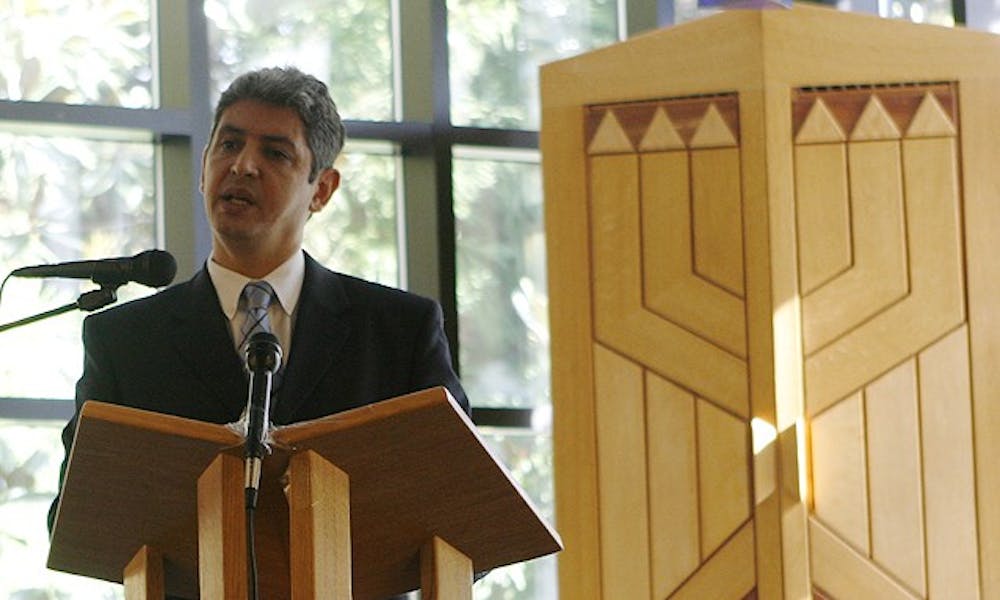The many faces of Israel in the 21st century were discussed at the Freeman Center Sunday as part of the Annual Southeast Region Student Conference.
The conference, titled “Free, Green & Cutting Edge: Israel in the 21st Century,” was hosted by the Consulate General of Israel to the Southeast in partnership with Jewish Life at Duke. The conference alerted students to American-Israeli relations and stressed to them the importance of staying informed as American youth, getting their facts straight and taking a stance on the current conflicts in the Middle East.
Keynote speaker Amos Guiora, profesor of law at the University of Utah’s S. J. Quinney College of Law, addressed the future of Iranian terrorism and its relevance to non-Israeli citizens. Ambassador Reda Mansour, consul general of Israel to the Southeast, presented a different perspective on Israel in his speech, portraying it as a culturally diverse and relatively unconflicted state. “The first thing we need to understand, frankly, is we are at a complicated crossroads,” Guiora said of U.S. involvement in the Israeli conflict.
With President Barack Obama’s use of rhetoric instead of policy and insufficient communications with Israel, the situation in the Middle East looks bleak, Guiora said. He added that Americans are uninformed and Israel has fallen victim to a unique species of conflict he coined “mediafare,” at the base of which is knowledge—or rather, a lack thereof.
“Once you get the facts wrong, information becomes misinformation,” Guiora said.
He noted that Obama’s recent claim that Israel’s creation was a result of the holocaust proved so poignantly that we as a nation are quite uninformed.
Guiora proposed a number of ways to go about solving this complicated problem—first, by acknowledging that terrorism is a fixture in the modern political scene. He also recommended increasing communication with Israel, recognizing Israel’s right to self defense, getting the nation to clearly articulate its goals and showing it is ready for peace.
“[Americans have to] understand how each of the different pieces of the puzzle affect Israel differently,” Guiora said.
This understanding is not limited to dealing with a potential Iranian nuclear power or the conflict with Palestine, he added, noting that it requires comprehension of the deep-rooted history of Israel and the complex relationships between Middle Eastern states.
Guiora left the audience with two take-home messages.
“You have to know your history... It’s hard, but it’s critical,” he said, adding that, “the most effective messengers are young people.”
Mansour presented Israel in a more optimistic and progressive light, focusing on the little-known diversity of Israel.
“I think it will be an achievement for us if we convince you that Israel really is more than the Arab-Israeli conflict,” he said.
Mansour’s speech ranged from a discussion of the growing influence of the Baha’i faith in Haifa, to the 19th century Egyptian retreat from the Ottoman Empire to a description of the various cultural impacts on Israel’s development.
“If you dig deep into this community there are so many cultures represented there,” he said.
Mansour also expressed his concern that Israel has been reduced to political headlines as of late.
“[Israel is the] gate to [Asia] from Europe, and to Europe from the region,” he said. “Allow us to be the model of diversity [for the Middle East].”
Other events in the conference included a Panel of Israeli Culture with Jodee Nimerichter, co-director of American Dance Festival, and Mishael Caspi, retired professor of philosophy and religion at Bates College. Breakout sessions were also held for students and Israeli experts to converse on such matters as the portrayal of Israel in the media and the U.S.-Israel relationship.
The conference drew a wide variety of attendees, ranging from freshmen to graduate students coming from schools as far as Rochester College and Appalachian State University.
Get The Chronicle straight to your inbox
Signup for our weekly newsletter. Cancel at any time.

